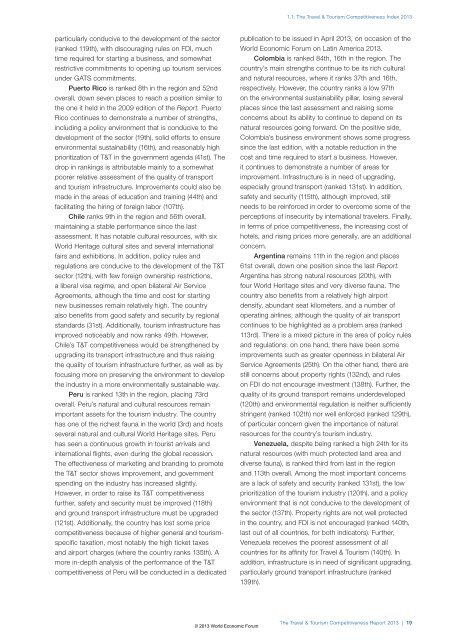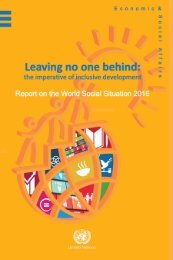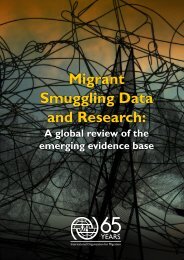The Travel & Tourism Competitiveness Report 2013
The Travel & Tourism Competitiveness Report 2013
The Travel & Tourism Competitiveness Report 2013
You also want an ePaper? Increase the reach of your titles
YUMPU automatically turns print PDFs into web optimized ePapers that Google loves.
particularly conducive to the development of the sector<br />
(ranked 119th), with discouraging rules on FDI, much<br />
time required for starting a business, and somewhat<br />
restrictive commitments to opening up tourism services<br />
under GATS commitments.<br />
Puerto Rico is ranked 8th in the region and 52nd<br />
overall, down seven places to reach a position similar to<br />
the one it held in the 2009 edition of the <strong>Report</strong>. Puerto<br />
Rico continues to demonstrate a number of strengths,<br />
including a policy environment that is conducive to the<br />
development of the sector (19th), solid efforts to ensure<br />
environmental sustainability (16th), and reasonably high<br />
prioritization of T&T in the government agenda (41st). <strong>The</strong><br />
drop in rankings is attributable mainly to a somewhat<br />
poorer relative assessment of the quality of transport<br />
and tourism infrastructure. Improvements could also be<br />
made in the areas of education and training (44th) and<br />
facilitating the hiring of foreign labor (107th).<br />
Chile ranks 9th in the region and 56th overall,<br />
maintaining a stable performance since the last<br />
assessment. It has notable cultural resources, with six<br />
World Heritage cultural sites and several international<br />
fairs and exhibitions. In addition, policy rules and<br />
regulations are conducive to the development of the T&T<br />
sector (12th), with few foreign ownership restrictions,<br />
a liberal visa regime, and open bilateral Air Service<br />
Agreements, although the time and cost for starting<br />
new businesses remain relatively high. <strong>The</strong> country<br />
also benefits from good safety and security by regional<br />
standards (31st). Additionally, tourism infrastructure has<br />
improved noticeably and now ranks 49th. However,<br />
Chile’s T&T competitiveness would be strengthened by<br />
upgrading its transport infrastructure and thus raising<br />
the quality of tourism infrastructure further, as well as by<br />
focusing more on preserving the environment to develop<br />
the industry in a more environmentally sustainable way.<br />
Peru is ranked 13th in the region, placing 73rd<br />
overall. Peru’s natural and cultural resources remain<br />
important assets for the tourism industry. <strong>The</strong> country<br />
has one of the richest fauna in the world (3rd) and hosts<br />
several natural and cultural World Heritage sites. Peru<br />
has seen a continuous growth in tourist arrivals and<br />
international flights, even during the global recession.<br />
<strong>The</strong> effectiveness of marketing and branding to promote<br />
the T&T sector shows improvement, and government<br />
spending on the industry has increased slightly.<br />
However, in order to raise its T&T competitiveness<br />
further, safety and security must be improved (118th)<br />
and ground transport infrastructure must be upgraded<br />
(121st). Additionally, the country has lost some price<br />
competitiveness because of higher general and tourismspecific<br />
taxation, most notably the high ticket taxes<br />
and airport charges (where the country ranks 135th). A<br />
more in-depth analysis of the performance of the T&T<br />
competitiveness of Peru will be conducted in a dedicated<br />
© <strong>2013</strong> World Economic Forum<br />
1.1: <strong>The</strong> <strong>Travel</strong> & <strong>Tourism</strong> <strong>Competitiveness</strong> Index <strong>2013</strong><br />
publication to be issued in April <strong>2013</strong>, on occasion of the<br />
World Economic Forum on Latin America <strong>2013</strong>.<br />
Colombia is ranked 84th, 16th in the region. <strong>The</strong><br />
country’s main strengths continue to be its rich cultural<br />
and natural resources, where it ranks 37th and 16th,<br />
respectively. However, the country ranks a low 97th<br />
on the environmental sustainability pillar, losing several<br />
places since the last assessment and raising some<br />
concerns about its ability to continue to depend on its<br />
natural resources going forward. On the positive side,<br />
Colombia’s business environment shows some progress<br />
since the last edition, with a notable reduction in the<br />
cost and time required to start a business. However,<br />
it continues to demonstrate a number of areas for<br />
improvement. Infrastructure is in need of upgrading,<br />
especially ground transport (ranked 131st). In addition,<br />
safety and security (115th), although improved, still<br />
needs to be reinforced in order to overcome some of the<br />
perceptions of insecurity by international travelers. Finally,<br />
in terms of price competitiveness, the increasing cost of<br />
hotels, and rising prices more generally, are an additional<br />
concern.<br />
Argentina remains 11th in the region and places<br />
61st overall, down one position since the last <strong>Report</strong>.<br />
Argentina has strong natural resources (20th), with<br />
four World Heritage sites and very diverse fauna. <strong>The</strong><br />
country also benefits from a relatively high airport<br />
density, abundant seat kilometers, and a number of<br />
operating airlines, although the quality of air transport<br />
continues to be highlighted as a problem area (ranked<br />
113rd). <strong>The</strong>re is a mixed picture in the area of policy rules<br />
and regulations: on one hand, there have been some<br />
improvements such as greater openness in bilateral Air<br />
Service Agreements (25th). On the other hand, there are<br />
still concerns about property rights (132nd), and rules<br />
on FDI do not encourage investment (138th). Further, the<br />
quality of its ground transport remains underdeveloped<br />
(120th) and environmental regulation is neither sufficiently<br />
stringent (ranked 102th) nor well enforced (ranked 129th),<br />
of particular concern given the importance of natural<br />
resources for the country’s tourism industry.<br />
Venezuela, despite being ranked a high 24th for its<br />
natural resources (with much protected land area and<br />
diverse fauna), is ranked third from last in the region<br />
and 113th overall. Among the most important concerns<br />
are a lack of safety and security (ranked 131st), the low<br />
prioritization of the tourism industry (120th), and a policy<br />
environment that is not conducive to the development of<br />
the sector (137th). Property rights are not well protected<br />
in the country, and FDI is not encouraged (ranked 140th,<br />
last out of all countries, for both indicators). Further,<br />
Venezuela receives the poorest assessment of all<br />
countries for its affinity for <strong>Travel</strong> & <strong>Tourism</strong> (140th). In<br />
addition, infrastructure is in need of significant upgrading,<br />
particularly ground transport infrastructure (ranked<br />
139th).<br />
<strong>The</strong> <strong>Travel</strong> & <strong>Tourism</strong> <strong>Competitiveness</strong> <strong>Report</strong> <strong>2013</strong> | 19

















